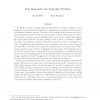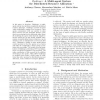517 search results - page 25 / 104 » UMAS Learning Requirement for Controlling Network Resources |
FUIN
2008
13 years 6 months ago
2008
Causal relations are present in many application domains. Causal Probabilistic Logic (CP-logic) is a probabilistic modeling language that is especially designed to express such rel...
CUZA
2002
13 years 7 months ago
2002
Metacomputing allows the exploitation of geographically seperate, heterogenous networks and resources. Most metacomputers are feature rich and carry a long, complicated installati...
SACMAT
2003
ACM
14 years 28 days ago
2003
ACM
We investigate the cost of changing access control policies dynamically as a response action in computer network defense. We compare and contrast the use of access lists and capab...
WDAG
2009
Springer
14 years 2 months ago
2009
Springer
The (M, W)-controller, originally studied by Afek, Awerbuch, Plotkin, and Saks, is a basic ted tool that provides an abstraction for managing the consumption of a global resource ...
AGENTS
1997
Springer
13 years 12 months ago
1997
Springer
In this paper we introduce Challenger, a multiagent system that performs completely distributed resource allocation. Challenger consists of agents which individually manage local ...


